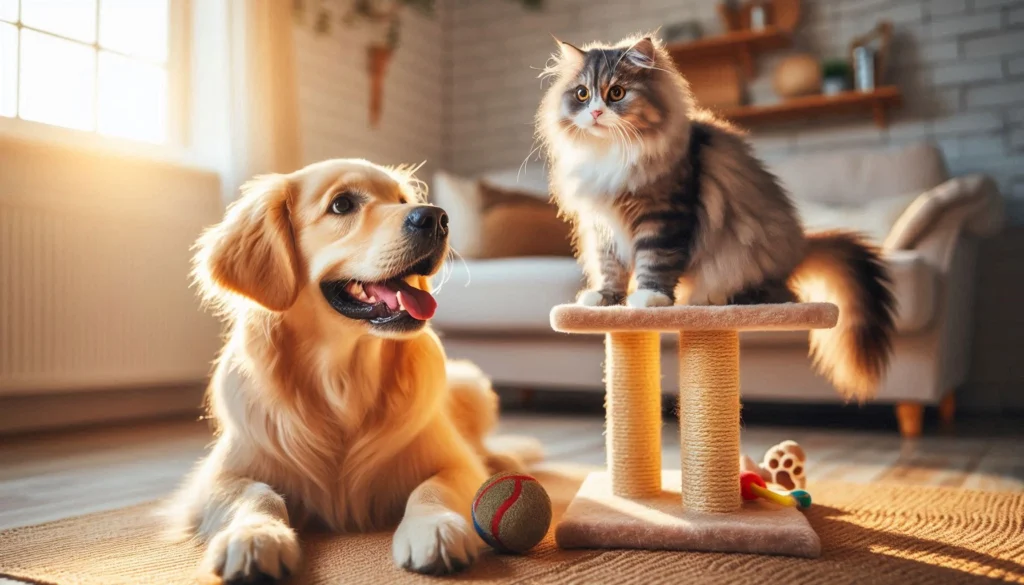Table of Contents
Questions as to whether it is dogs that supersede cats or the other way around that all of mankind must have, by definition, a domestic pet has dominated history. Each comes in its own uniqueness that makes people love millions of each. For others, though, it is the dog due to their loyalty, ability to train, and necessity for human interaction. For others, cats make for the perfect pet because they are self-sufficient nature, playful attitudes, and silent companionship.
Actually, it is pretty easy to understand why we compare them (dogs vs cats, who has more intelligence, playfulness, and trainability). Where they really do differ if in how they interact with their owner, what type of care needs or the manner at which they can live within a household. These traits are differing between the two species which will give those thinking of adopting a new pet some thought to decide which is better for their lifestyle.
We will have a look at these three main areas-intelligence, playfulness, and finally trainability-to be able to determine the best pet: dogs or cats? Though these pets are in different leagues, this article is intended to give you an idea about their personality traits and what to expect when introducing one of them into your house. When it really comes down to the choice of dogs vs. cats, much responsibility for the final decision lies in personal preference; however knowledge of many of these traits can help disguise your understanding as to which may best be suited for last_pet:dog and last_pet:cat .
Intelligence: Dogs vs. Cats
Some people are actually debating whether it’s dogs vs cats or which animal is smarter. The term is fuzzy, but the definition of intelligence does tend to focus on problem solving, social cognition, and the way in which an animal has an interchange with its surroundings. A perfect tie Dogs and cats are both intelligent in their own ways, which makes them equal in love.
Dog intelligence: Dogs are believed to be intelligent and have the capacity of learning commands, and the knowledge of imitating human behavior by observing social cues like a human. Dogs have been domesticated for thousands of years, and the intelligence they have is basically because of their capacity to learn new things and follow instructions. For instance, herding dogs are among the best-working dogs by the actual higher cognitive thoughts. They have tremendous abilities to be doing things like herding and tracking, while others can be trained to detect medical conditions.
Cats, on the other hand are far more independent in their thinking, however. They are often cold-blooded, but it’s mainly due to how they express their intellect. There are many areas wherein cats outperform some other competitors with problem correction in the physical environment. They are very good hunters and foragers in their target population and learn fast as far as finding food or escaping from tight spots go.
Cats often express their intelligence in ways that are not as demonstrable to humans because they are not nearly as motivated by the desire to please. They rely solely on their cognitive ability to let them have silent locomotion and independence in their environment. Although cats lack brilliance in social intelligence, they shine brighter in problem-solving ability and adaptability. While each species has its own version of intellect, it is what they display it in that differentiates the two.
Playfulness: Dogs vs Cats

Playfulness is another major aspect when comparing dogs and cats. Though both animals are playful, it is how they play it. For instance, play in dogs is predominantly a social matter that involves owners or even other dogs. They are fond of all kinds of games that require chasing and fetching, and other athletic contact. This play not only burns off some excess energy in dogs but also brings them close to humans. Such play is very much enjoyed by dog breeds like Labradors and Golden Retrievers, which can play for hours without getting tired.
Contrastingly, cats show a lot of playfulness more independently and fitfully. Many of the playful actions of a cat are fueled by this instinctual urge to hunt. They lash out at toys, chase laser beams, or swat with their paws. This independent play reflects their historical background as solitary predators. Though cats can indeed be playful, they tend to get in and out quickly and have much shorter play sessions compared to dogs; they prefer to play on their own accord.
Where dogs and cats use play to keep both the mind and the body stirred, the way they interact with the environment and owners differ. Dogs always drag their owners into play, making them perfect friends for anyone who enjoys energetic interaction. Cats, on the other hand, are choosier and usually play when they feel like playing rather than when they have been instructed to do so. However, when they do play, it can sometimes be vigorously entertaining.
In the final analysis, it really is a matter of what kind of pet and which breed when one tries to determine which animal-the dog or the cat-is more playful. Some cats can be as playful as dogs, but some dogs do not want to play. In general, though, dogs tend to be playful at a relatively consistent level through their lives, while cats have play periods that are more short and intense.
Trainability: Dogs vs Cats
But as far as the trainability goes, dogs are usually more in favor of training than cats. Dogs have been bred for so many years for human-related purposes like herding livestock, helping hunters, and as guard dogs. Therefore, dogs tend to be very receptive to being trained since they respond well to a leader due to their nature as pack animals.
From simple commands like “sit” or “stay” to the job of leading the blind or detecting bombs, dogs can be trained in virtually any skill you might want. Some breeds are recognised by their superior trainability: Border Collies, German Shepherds, and Poodles top the list for being highly intelligent and eager to please. But all require patience and consistency, and most dogs are incredibly responsive to praise and treat rewards, which makes the process rather more pleasant.
With cats, it seems a bit more challenging to train because, by instinct, cats are solitary and viewed often as so. This independent attribute of the cat separates the gregariousness of cats from that of dogs. Instead of living in packs, by their nature, cats are solitary creatures and, as such, are not motivated to obey commands or work together. However, cats can be trained to some extent. Since many cat owners have successfully taught their cats to use the litter box, come when called, or even perform tricks through positive reinforcement methods such as clicker training, most people attest to the fact that cat training is possible.
But training a cat demands much patience and is very often incentive towards the cat’s purely instinctive potential. Cats tend to react better to training based on instinct, such as hunting or climbing. All else being equal, cats are unlikely to compete with the level of obedience and responsiveness found in dogs. If easy trainability is an important consideration, then dogs overwhelmingly take the prize hands down.
Related Post







2 thoughts on “Dogs VS Cats: Discover the Smartest Pet!”